Can Essential Oils Be Used as Perfume
Have you ever wondered about the benefits of using essential oils as perfume?
We will explore what essential oils are, how they differ from traditional perfumes, and how they can be used as a natural and chemical-free alternative.
Discover the best essential oils for creating your own unique scent blends and learn about potential risks and side effects.
If you’re curious about incorporating essential oils into your fragrance routine, keep reading to learn more!
Key Takeaways:
What Are Essential Oils?
Essential oils are natural aromatic compounds extracted from plants, known for their distinct scents and various health benefits. They are highly concentrated and are often used in aromatherapy, skincare, and creating perfumes.
The extraction process of essential oils involves various methods such as distillation, cold pressing, or solvent extraction, depending on the plant material and desired oil. Each method retains the unique properties of the plant, resulting in a potent and fragrant oil.
Aromatherapy utilizes these oils to promote relaxation, improve mood, and alleviate stress. In skincare, essential oils are valued for their rejuvenating and nourishing properties, often used in creams, lotions, and serums.
In the world of perfumery, essential oils serve as the base, middle, and top notes in creating complex and captivating scents.
How Are Essential Oils Different from Perfumes?
Essential oils are natural extracts obtained from plants, offering pure and unadulterated scents, while perfumes often contain synthetic fragrances and chemicals. The primary distinction lies in their composition and source, with essential oils being derived from botanical sources and perfumes typically consisting of a blend of natural and synthetic ingredients.
Essential oils are known for their therapeutic properties and are valued for their holistic benefits beyond just fragrance. They are extracted through methods like steam distillation or cold pressing, ensuring the preservation of their natural compounds. On the other hand, perfumes are crafted in laboratories, allowing for a wide range of scents that can mimic natural essences.
- Essential oils are highly concentrated and should be diluted before direct application on the skin, while perfumes are already diluted and ready for use.
The purity level of essential oils is crucial, as they can vary from pure essential oils to those mixed with carrier oils or synthetic additives. In contrast, perfumes are formulated to have a longer-lasting scent, making them a popular choice for daily wear and special occasions.
Can Essential Oils Be Used as Perfume?
Yes, essential oils can be used as a natural alternative to commercial perfumes. Their aromatic profiles make them ideal for creating unique and personalized scents that cater to individual preferences.
One of the remarkable aspects of essential oils is their diverse range of fragrances, stemming from various plants, flowers, fruits, and herbs. This lends a natural, earthy charm to the perfume, unlike synthetic fragrances. These oils are often gentler on the skin, suitable for people with sensitivities or allergies to synthetic ingredients found in conventional perfumes.
Another advantage of using essential oils for perfume is the ability to customize scent blends. By mixing different oils in varying proportions, you can create a signature scent that reflects your personality and style. This customization aspect adds a personal touch that is lacking in mass-produced perfumes.
How to Use Essential Oils as Perfume
When using essential oils as perfume, it is essential to dilute them with a carrier oil to ensure skin safety and optimal scent diffusion.
For dilution ratios, a common guideline is to mix about 2-3% of the essential oil into the carrier oil, depending on the oil’s potency and your preference for the intensity of the fragrance.
Blend the essential oils thoughtfully; start with a few drops of the top notes for the immediate impression, add some heart notes for the depth of the scent, and finish with the base notes for a lasting presence.
When applying the perfume, a popular method is to dab or roll it on pulse points like wrists, neck, and behind the ears to enhance longevity and diffusion.
Layering notes involves applying different oils in sequence, allowing each to evaporate before adding the next, resulting in a complex and enchanting aroma that evolves over time.
Which Essential Oils Are Best for Perfume?
Selecting the best essential oils for perfume creation involves considering the top, base, and heart notes to achieve a harmonious blend. Popular choices include lavender, rose geranium, bergamot, lemon, and grapefruit for their versatile scents and blending capabilities.
Regarding top notes, citrus oils like bergamot and lemon provide a refreshing and uplifting aroma, ideal for creating that initial burst of fragrance in your perfume. These zesty oils pair beautifully with floral notes such as lavender and rose geranium, which fall under the category of heart notes. Lavender, with its soothing and calming scent, complements the invigorating qualities of citrus oils, while rose geranium adds a touch of floral sweetness.
For base notes, grapefruit is a versatile option that adds depth and complexity to the perfume blend. Its slightly woody and warm undertones make it a fantastic complement to the brighter top and heart notes. Blending grapefruit with deeper scents like patchouli or sandalwood can create a rich and long-lasting fragrance that lingers on the skin.
What Are the Benefits of Using Essential Oils as Perfume?
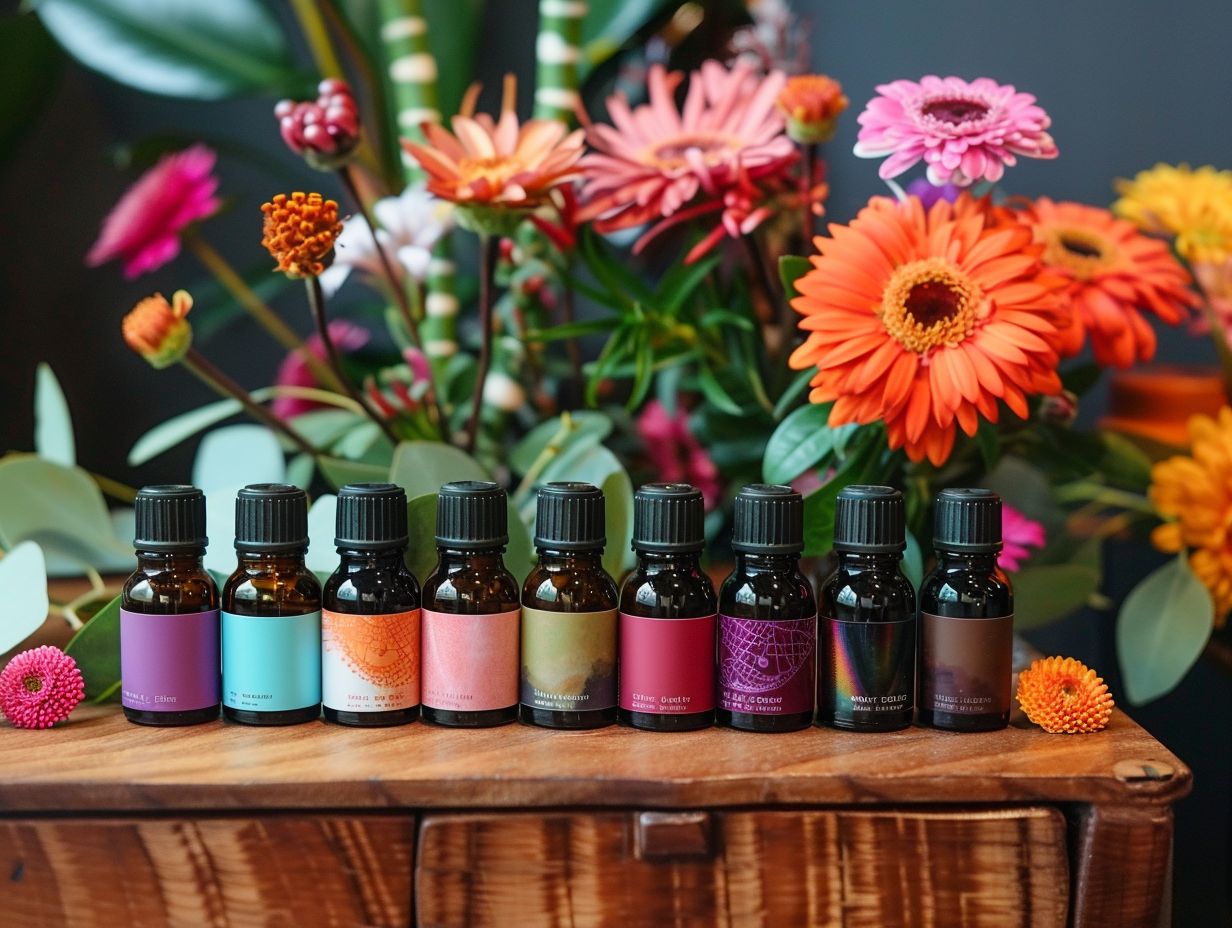
These essential oils are extracted from plants, each carrying unique aromatic profiles that can uplift your mood, reduce stress, or even boost focus.
They provide a holistic approach to personal care, leveraging the capabilities of nature to enhance both physical and emotional health.
Their versatility allows you to create custom blends tailored to your preferences and needs, offering a personalized and distinctive scent signature.
The fragrance of essential oils tends to linger on the skin for hours, offering a subtle and enduring aroma that adapts and deepens as it interacts with your body’s chemistry.
Natural and Chemical-Free
One of the key benefits of using essential oils as perfume is their natural and chemical-free nature, offering a safe and non-toxic alternative to synthetic fragrances. This makes them ideal for individuals with sensitivities or those seeking a more holistic approach to fragrance.
Essential oils not only smell wonderful but also boast numerous health benefits. These oils are extracted directly from plants, containing the essence of the botanicals themselves, which can have calming, energizing, or mood-lifting effects on the mind and body.
Due to their natural origins, essential oils are known for their aromatherapy qualities, promoting mental clarity, relaxation, and even aiding in stress relief. The varied scents derived from essential oils cater to a wide range of preferences, making it easier for individuals to find a personalized fragrance that resonates with them.
Therapeutic Properties
Essential oils used in perfumes offer therapeutic properties that can positively impact mental, emotional, and physical well-being. Their aromatherapy benefits include stress relief, mood enhancement, and relaxation, making them valuable additions to daily scent routines.
Essential oils are derived from plant extracts, each possessing its unique blend of healing properties. For instance, lavender oil is known for its calming effects, while peppermint oil can invigorate the senses. The use of essential oils in perfumes not only creates enticing scents but also serves as a natural remedy for various ailments. Incorporating these oils into your daily routine can promote relaxation after a long day, alleviate anxiety, and boost overall emotional wellness.
Long-Lasting Scent
Essential oil perfumes are known for their long-lasting scents that evolve and linger on the skin throughout the day. The complex compositions of top, heart, and base notes ensure a multi-dimensional fragrance experience that endures over time.
The top notes, which are the first impression of a perfume, are usually citrus or fruity scents that are uplifting and refreshing. They fade relatively quickly, giving way to the heart notes, which form the essence of the fragrance and provide the main character. The base notes, often woody or musky, anchor the scent and help it last longer on the skin.
Essential oils, extracted from natural sources such as flowers, fruits, spices, and woods, contribute to the complexity and richness of these perfumes. Factors like individual skin chemistry, environmental conditions, and the quality of the oils used also play a significant role in determining how long the fragrance will last.
Are There Any Risks or Side Effects of Using Essential Oils as Perfume?
While essential oils offer numerous benefits, there are potential risks and side effects when using them as perfumes. These include skin irritation, allergic reactions, and sensitivity to sunlight, which can vary based on individual sensitivities and oil concentrations.
It is essential to be cautious when using essential oils as perfumes, especially if you have sensitive skin or a history of skin conditions. Skin irritation such as redness, itching, or burning may occur when these potent oils come into direct contact with the skin.
Allergic reactions are another significant concern, with symptoms ranging from mild to severe, including rashes, hives, or even respiratory issues in some cases. It is crucial to perform a patch test before applying any essential oil perfume to check for any adverse reactions.
Certain essential oils, particularly citrus oils like bergamot or lemon, can cause photosensitivity when exposed to sunlight, leading to skin discoloration or burns. To prevent such issues, it is recommended to avoid sun exposure after applying these oils or diluting them properly before use.
Skin Irritation
Skin irritation is a common side effect of using essential oils as perfumes, particularly when applied directly to the skin or in high concentrations. Certain oils may cause redness, itching, or inflammation, necessitating patch testing and proper dilution for sensitive individuals.
It is crucial to be aware of the symptoms of skin irritation from essential oils, which can include stinging, burning sensations, or even blistering in severe cases. To prevent adverse reactions, consider diluting essential oils with carrier oils like coconut or jojoba oil before application. A general rule of thumb for dilution is about 2-3% for adults and even lower for children or those with sensitive skin. Performing a patch test on a small area before full application can help identify potential sensitivities.
Allergic Reactions
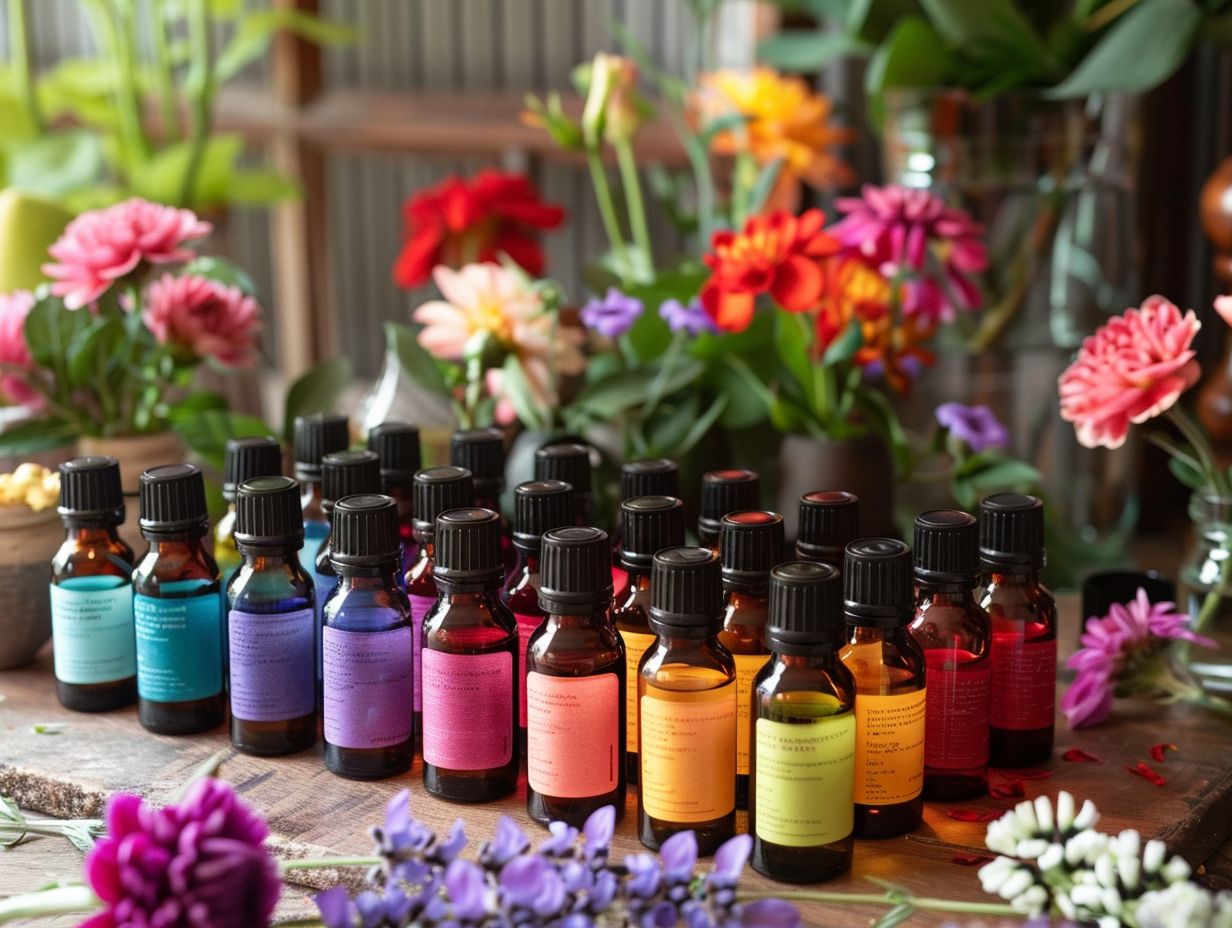
Particular essential oil components, like limonene or linalool, are common allergenic triggers found in perfumes, potentially causing skin irritation or respiratory issues.
Some individuals may also experience symptoms such as headaches, dizziness, or nausea upon exposure to strong perfume scents.
- Patch tests on a small area of skin can help determine sensitivity to specific oils before using them widely.
- For individuals prone to allergies, opting for fragrance-free products is a safer choice to avoid potential reactions.
Sensitivity to Sunlight
Some essential oils can cause photosensitivity, making the skin more susceptible to sun damage and burns upon exposure to UV rays. Citrus oils like lemon, bergamot, and grapefruit are known to have phototoxic effects and should be used cautiously in perfumes for outdoor wear.
When these oils are applied topically to the skin and then exposed to sunlight, they can lead to a condition known as phytophotodermatitis, resulting in redness, blistering, and increased sensitivity. To prevent such reactions, it is advisable to avoid applying perfumes containing phototoxic oils on skin that will be exposed to direct sunlight for extended periods.
For individuals using these essential oils, it is essential to take precautionary measures such as applying sunscreen with high SPF before going out in the sun or wearing protective clothing to minimize the risk of sun damage. It is recommended to limit sun exposure during peak hours and to frequently reapply sunscreen to provide adequate protection.
It is also crucial to be mindful of the concentration of phototoxic oils in perfumes and opt for lower dilutions when formulating blends for daily use. By being aware of the potential risks associated with sun sensitivity from certain essential oils, individuals can enjoy their fragrance products while safeguarding their skin health.
How to Properly Dilute Essential Oils for Use as Perfume?
Properly diluting essential oils for use as perfume is crucial to prevent skin irritation and ensure an optimal fragrance balance. Mixing essential oils with a carrier oil like sweet almond or coconut oil helps reduce potency and improves skin absorption, enhancing the overall scent experience.
When diluting essential oils, it is recommended to follow a general ratio of 2-3% essential oil to carrier oil for safe use on the skin. This equates to about 12-18 drops of essential oil per ounce of carrier oil.
- For a light scent, opt for a lower dilution percentage
- For a stronger aroma, increase the concentration slightly
Blending different essential oils can create unique fragrance profiles, so experiment with combinations that complement each other. Additionally, patch testing the diluted blend on a small area of skin before widespread application can help identify any potential sensitivities or allergic reactions.
Can Essential Oils Be Used as Perfume for Sensitive Skin?
Essential oils can be used as perfume for sensitive skin, provided they are properly diluted and chosen with skin-friendly properties in mind. Opting for hypoallergenic oils like chamomile, rose geranium, or jasmine can minimize the risk of skin reactions while offering a subtle and soothing fragrance.
When considering essential oils for sensitive skin, it’s crucial to ensure that they are gentle and non-irritating. Chamomile oil, known for its calming properties, can soothe sensitive skin and promote relaxation. Rose geranium is another excellent choice for its balancing effects on the skin, making it ideal for those with sensitivities. Similarly, jasmine oil not only has a wonderful floral scent but also assists in hydrating the skin.
To prevent any adverse reactions, it’s essential to dilute these oils properly before applying them to the skin. A common dilution ratio is around 1-2%, which means mixing 1-2 drops of essential oil with 1 teaspoon of carrier oil. This dilution helps maintain the efficacy of the oil while minimizing the risk of irritation.
What Are Some Popular Essential Oil Perfume Blends?
Popular essential oil perfume blends combine harmonious scents to create unique and captivating fragrances. Common combinations include lavender and citrus for a fresh aroma, or cedarwood and jasmine for a warm and floral bouquet.
These meticulously curated combinations not only offer a sensory delight but also possess therapeutic benefits due to the natural properties of the essential oils used. Blending techniques play a crucial role in harmonizing the individual characteristics of each oil, ensuring a well-rounded olfactory experience. From uplifting citrus notes to grounding woody undertones, each blend tells a story, evoking emotions and memories.
Frequently Asked Questions
Can essential oils be used as perfume?
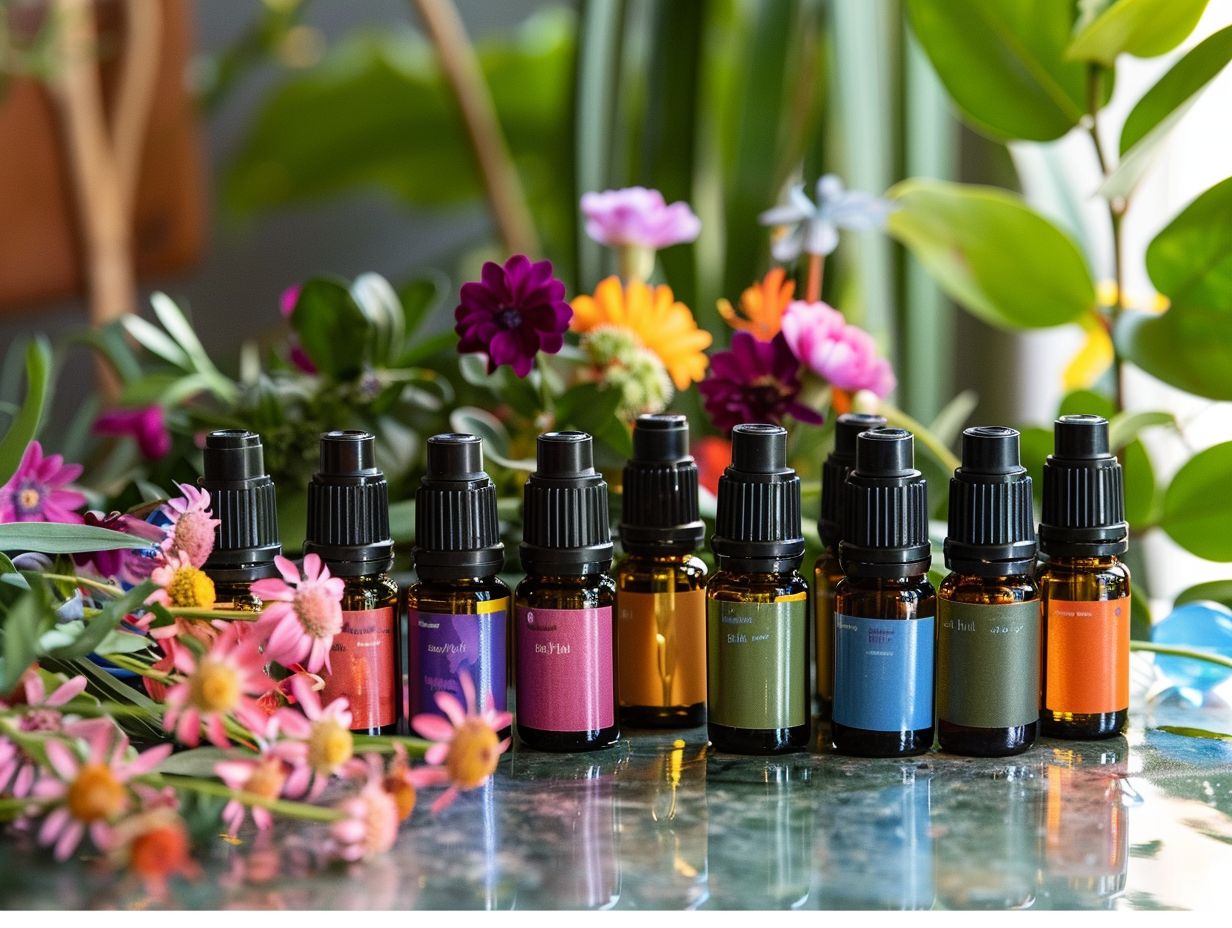
What are essential oils?
Essential oils are natural oils extracted from plants, flowers, and herbs that contain the plant’s scent and essence.
How do I use essential oils as perfume?
You can use essential oils as perfume by diluting a few drops in a carrier oil, such as jojoba or almond oil, and applying it to your pulse points.
Are essential oils safe to use as perfume?
Yes, essential oils are generally safe to use as perfume, but it is important to do a patch test first and always dilute the oil before applying it to your skin.
What are the benefits of using essential oils as perfume?
Using essential oils as perfume not only gives you a natural and unique scent, but it can also provide aromatherapy benefits, such as promoting relaxation and reducing stress.
Which essential oils are best for using as perfume?
There are many essential oils that can be used as perfume, but some popular options include lavender, rose, jasmine, and citrus oils like lemon and orange. It ultimately depends on your personal preference and desired scent.

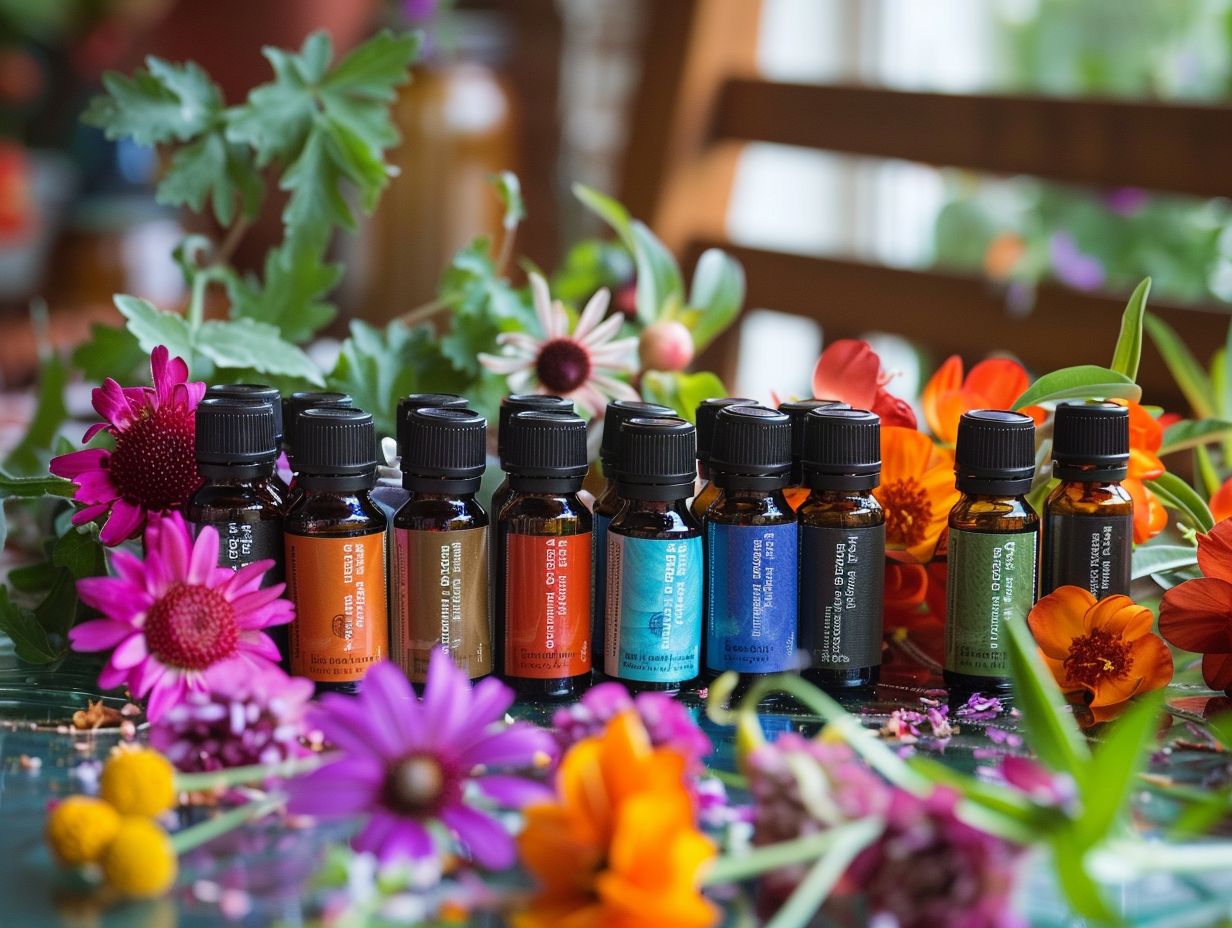



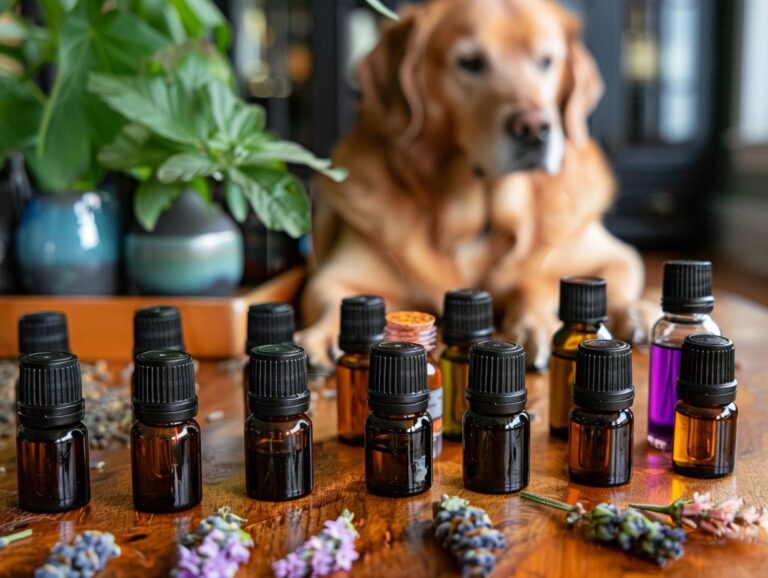

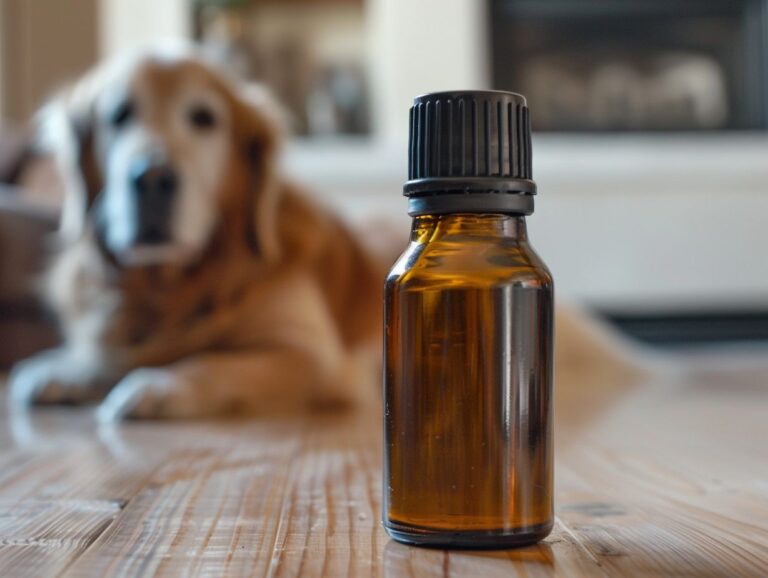
7 Comments